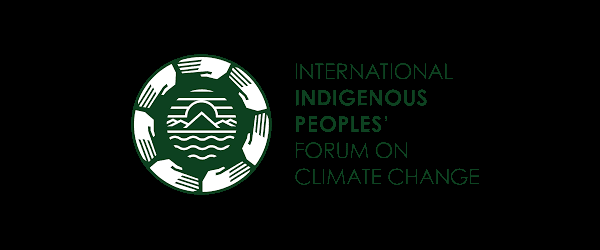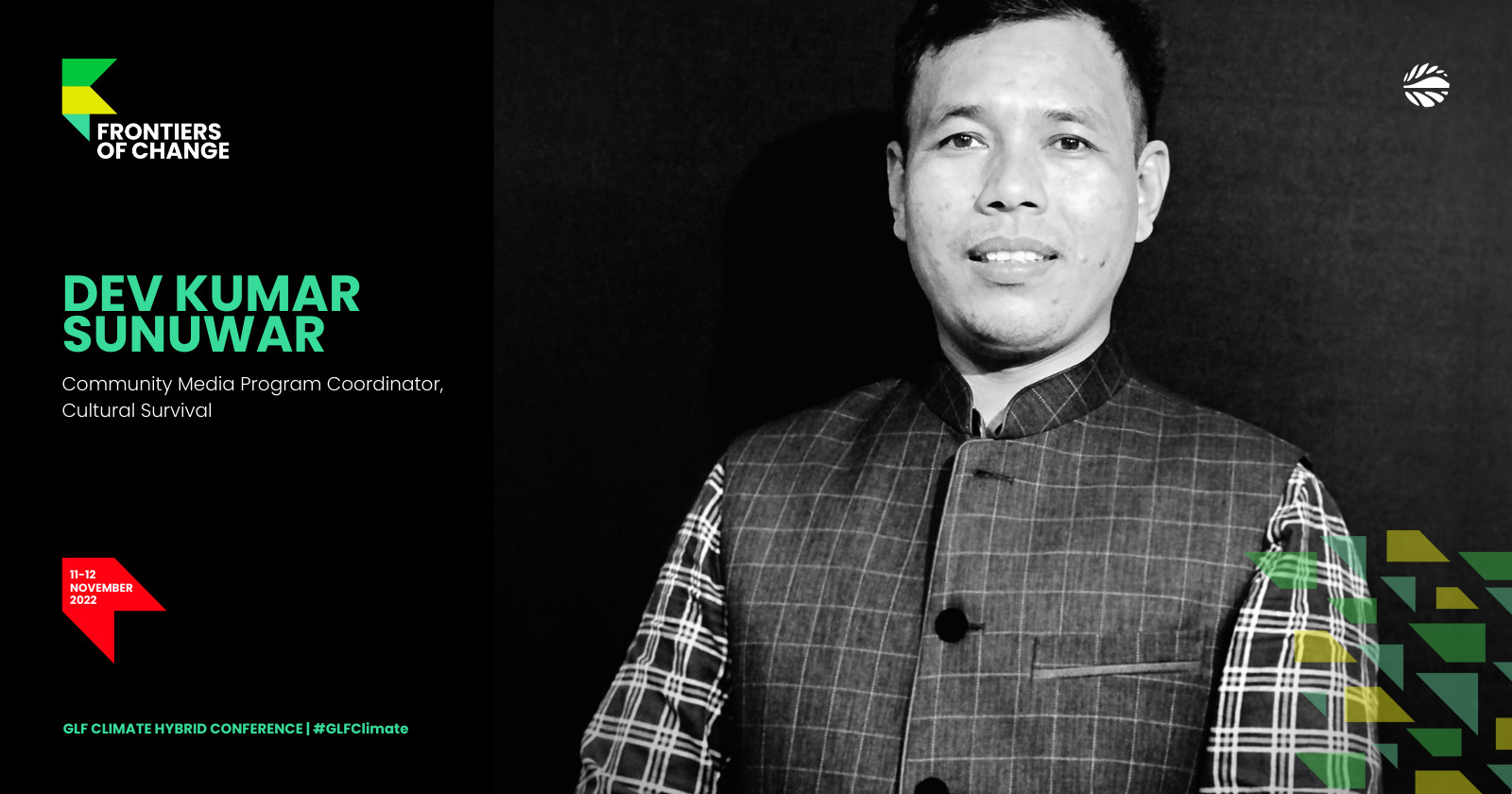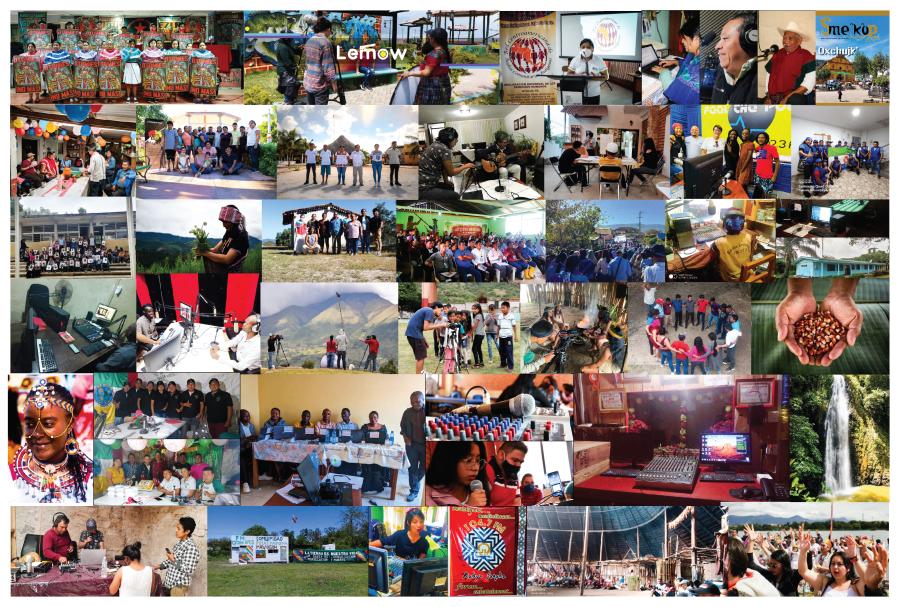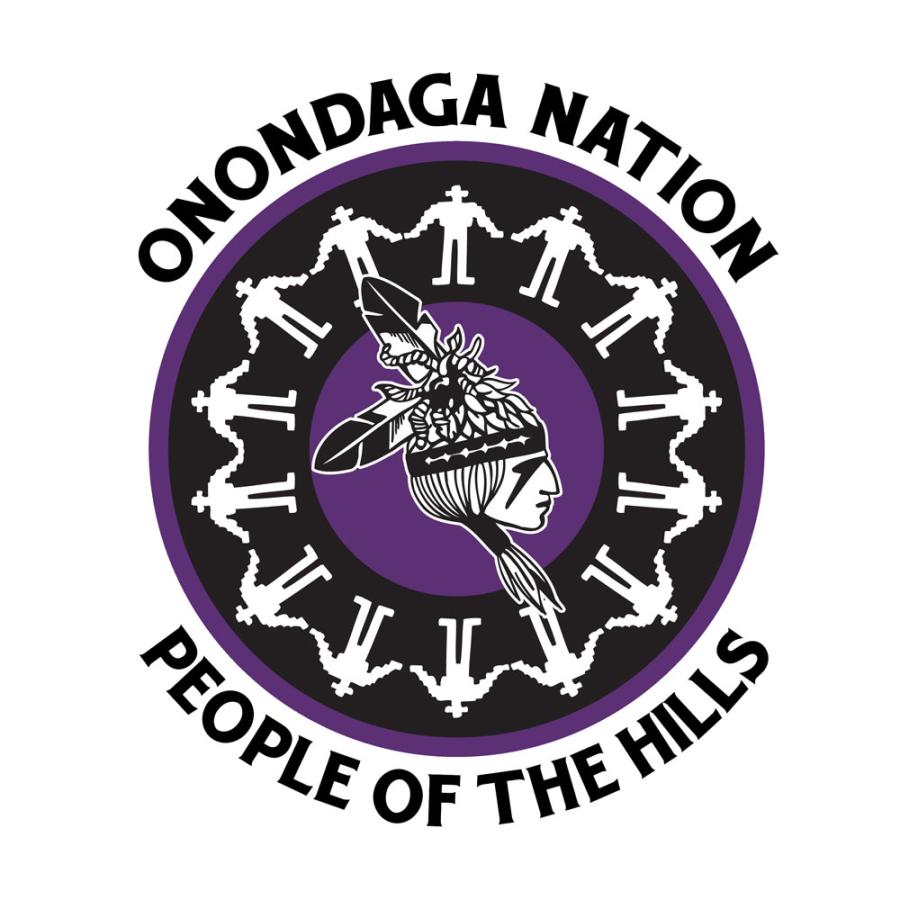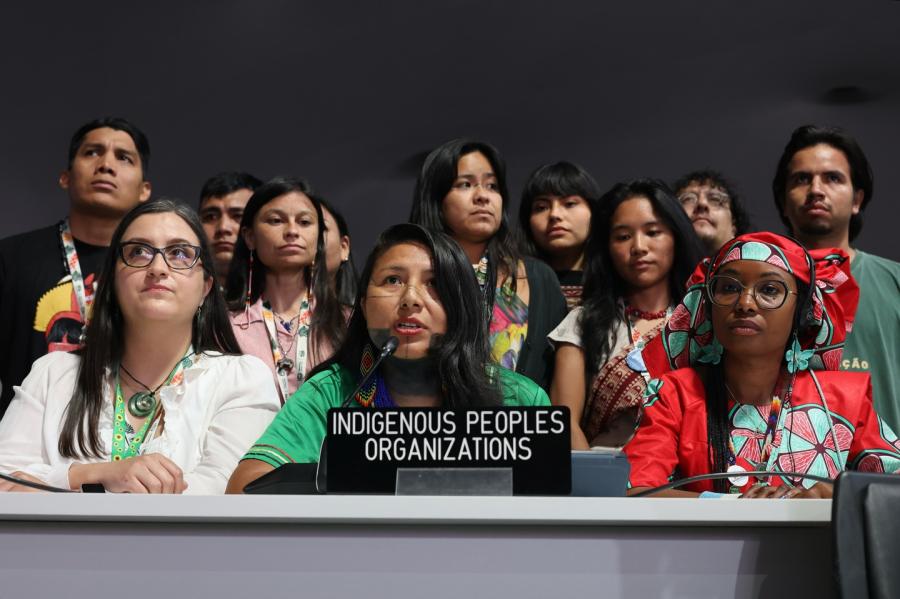Cultural Survival's delegation is on the ground at the United Nations Framework Convention on Climate Change (UNFCCC) Conference of Parties (COP 27) in Sharm El Sheikh, Egypt, through November 18. We are excited to share that Indigenous Peoples have one of the largest delegations to date, with close to 250 Indigenous representatives. The growing Indigenous presence can be seen through 35+ events at the Indigenous Peoples Pavilion, as well as Indigenous-led events in the Blue and Green Zones.
During the first week of CO27, the Local Communities and Indigenous Peoples Platform (LCIPP) hosted the two-part Annual Gathering of Knowledge Holders. The first part of the meeting served as a meeting among Indigenous knowledge holders including youth. It focused on intergenerational and cross-regional knowledge-sharing and the development of recommendations based on Indigenous knowledge and local knowledge, methods, lived experiences, and practices. In the second part, knowledge holders presented traditional knowledge-based observations and recommendations, and proposals for integrating this knowledge into climate action and policies. Also during the first week, LCIPP hosted the two-part Annual Youth Round Table. The first part consisted of a discussion on the enhancement of meaningful participation of Indigenous youth and youth from local communities in climate policies and action. In the second part, Indigenous youth and youth from local communities presented recommendations on their meaningful participation in climate policies and action.
Cultural Survival’s delegation has been following the negotiations on the ground, on matters important to the rights and futures of Indigenous Peoples. On the cover text for this COP, Indigenous negotiators are ensuring that the text upholds the commitments to the rights-based safeguards within the existing Glasgow Climate Pact, including the preambular text of the Paris Agreement. They are also making sure that Indigenous perspectives are taken into account, including in loss and damage, and have communicated specific recommendations on what can be incorporated in loss and damage. At the same time, they are ensuring that other proposals for the text do not violate the rights of Indigenous Peoples.
Negotiations continue on Article 6, where negotiators are advocating for the inclusion of Indigenous perspectives as well as making sure that carbon markets do not violate the rights of Indigenous Peoples. Another important development is related to Article 6.8, there are discussions around a work plan and the role of the independent grievance mechanisms, there will be more information on this front during week two of negotiations.
Indigenous representatives have participated in the three round tables of the Global Stocktake and have contributed the Indigenous perspectives on mitigation, adaptation, and loss and damage, including as it relates to current discussions on the creation of a loss and damage finance facility. There has also been discussion and negotiation on the Warsaw International Mechanism as well as the Santiago Network, both of which Indigenous Peoples have expressed their commitment to a rights-based approach.
On adaptation, there are discussions around the Global Goal on Adaptation and the implementation of that global goal as it relates to four thematic areas. Indigenous negotiators in this space are making sure that Indigenous rights, Indigenous knowledge systems, and the participation of Indigenous Peoples are considered in this discussion. Finally, on the Mitigation Work Plan, negotiators are advocating for a rights-based approach to ensure that Indigenous Peoples are not harmed by planned practices of mitigation.
Principles and Guidelines for Direct Access Funding for Indigenous Peoples’ Climate Action, Biodiversity Conservation and Fighting Desertification for a Sustainable Planet
On November 12, the International Indigenous Peoples Forum on Climate Change presented the newly adopted Principles and Guidelines for adequate and accessible financing. The vision of this initiative is to establish a permanent independent Indigenous-led global funding mechanism to support global coordination, solidarity, and experience/knowledge sharing, lobbying, and advocacy work for Indigenous Peoples from the seven socio-cultural regions to contribute to efforts towards enhanced biodiversity conservation, slowing and halting desertification, protecting all life and effectively respond to the impacts of climate change. Cultural Survival celebrates these principles, as a first step towards ensuring adequate and accessible financing for Indigenous Peoples' self-determined climate action.
We are also happy to report that there has been a lot of movement and discussion around direct access to climate finance for Indigenous Peoples during the first week of COP27, which will continue in the second week, this is reflected in the many events focused on this topic and the several engagements of Indigenous negotiators advocating for more flexible access to climate financing for Indigenous Peoples.
Our team on the ground has also been participating in several side events as part of our advocacy work during week one, with events focused on Indigenous rights, the Just Transition, climate finance, and food systems.
Our team continues to engage several Indigenous leaders on the different thematic issues being discussed. Below, we share with you a sample of the interviews conducted.
Follow us on Facebook, Twitter, and Instagram as we report on key actions and takeaways from COP 27.
The Position of Indigenous Peoples on Article 6 Paragraph 4
The International Indigenous Peoples Forum on Climate Change (IIPFCC) gives its preliminary observation of the draft text entitled “Recommendations on activities involving removals under the mechanism established under Article 6 Paragraph 4, of the Paris Agreement”. Read more.
The Position of Indigenous Peoples on the COP27 Cover Decision
The International Indigenous Peoples Forum on Climate Change (IIPFCC) collectively requests Parties to support the following language to be included in the COP27 Cover Decision. Read more.
Indigenous Voices from COP 27

Graeme Reed (Anishinabe) - An Update on Week 1

Eileen Mairena Cunningham (Miskito) on the Highlights for Week 1
Lars Anders Baer (Sami) - We Are Paying a High Price for the Green Economy
 Sara Elvira Kuhmunen (Sami) - Young People Must Join the Fight!
Sara Elvira Kuhmunen (Sami) - Young People Must Join the Fight!

Kenneth Deer (Mohawk) - Traditional Knowledge Is Very Important to Combat Climate Change

Peter Irniq (Inuit)- Inuit Peoples Still Hunt, But It Is Dangerous Now

Raymond Minniecon (Goreng Goreng) - More Action, Less Talk!

Rodion Sulyandziga (Udege): It Is Time to Evaluate the COP Processes trom the Indigenous Perspective

Joan Carling (Kankanaey): Recognize Indigenous Peoples as Stewards of Nature

Edna Kaptoyo (Pokot) - Now Is the Time to Call for Action!

James Anaya (Apache and Purépecha) - The COP Process Addresses Climate Change in a Real Way

Johnson Cerda (Kichwa) - On The Glasgow Climate Pact

Dario Mejía Montalvo (Zenú) - Los estados no han podido resolver asuntos para mitigar el cambio climático

Harol Rincon (Maguta) - Retos de los Pueblos Indígenas para mitigar los efectos del cambio climático

Vairoa Ika (Rapanui) - El Cambio climático y la cosmovisión de los Pueblos Indígenas

Maria Eugenia Choque Quispe (Aymara) - ¿Cómo la crisis climática afecta la vida de los pueblos Indígenas?
Access Recordings of our Events at COP 27
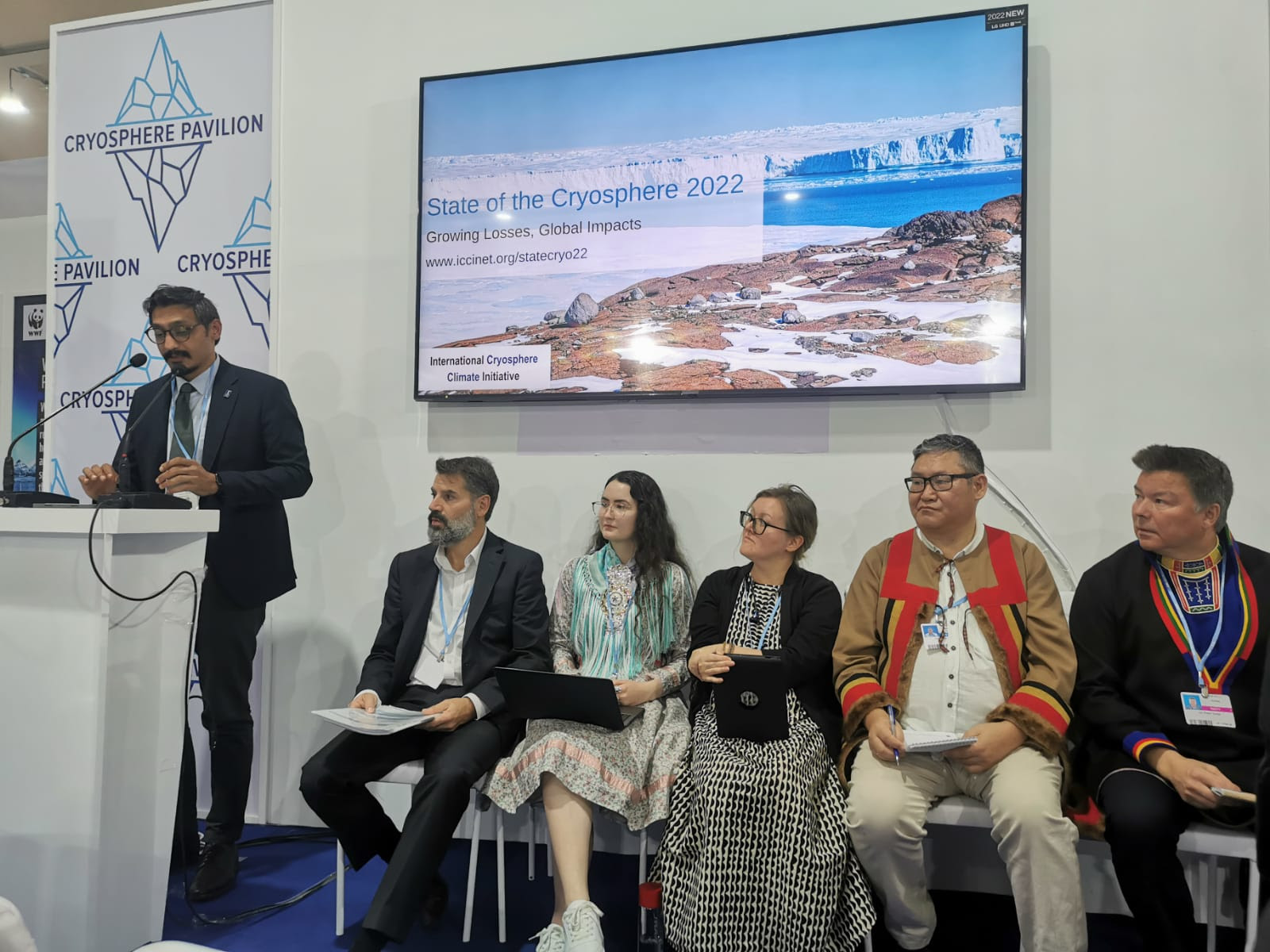
November 10
From the COP27 Cryosphere Pavilion! Indigenous Peoples’ Food Systems in the Arctic as Game Changers for Climate Action
Cultural Survival Delegate Polina Shulbaeva (Selkup) spoke about the main challenges Indigenous Peoples in the Russian Arctic are facing.
Watch here.

November 10, 2022
Who Pays: Climate Financing and the Real Cost of a Just Energy Transition
Cultural Survival's Executive Director, Galina Angarova spoke about the impacts of the so-called Just Transition on Indigenous Peoples and called for respect of Indigenous Peoples' right to self determination and implementation of the right to Free, Prior and Informed Consent in the Transition to a Green Economy. Lesley Munoz (Colla), Cultural Survival's delegate to COP27, talked about the impacts of lithium mining in her territory on the land, water and biodiversity.
Organizers: Ford Foundation and Cultural Survival
Watch here.

November 11, 2022
GLF Frontiers of Change Stewardship Economy Plenary
Galina Angarova (Buryat), our Executive Director spoke about the need to center Indigenous Peoples' and human rights as well as true, regenerative practices as we transition to a green economy. Healthy and sustainable economies should mirror healthy ecological systems.
Watch here.

November 12, 2022
Securing Indigenous Rights in the Transition to a Green Economy
Members of the SIRGE Coaliton talked about the current trends in the mining of Transition Minerals, explained how FPIC is essential to protect Indigenous Peoples rights, shared case studies of Indigenous Peoples engagement with the mining sector, brought attention to specific cases from communities affected by mining of Transition Minerals, introduced the SIRGE coaltion and made a call to action from all stakeholders involved in the Transition to a Green Economy.
Organizers: Global Landscape Forum (GLF) and Cultural Survival
Watch here.
November 12, 2022
GLF Frontiers of Change Closing Plenary
Dev Kumar Sunuwar (Koĩts-Sunuwar), Cultural Survival Community Media Program Coordinator, shared about how we can ensure development pathways create value for Indigenous and local people based on low-carbon economies.
Watch here.
November 14, 2022
Strengthening Indigenous Peoples' Resilience through Direct Access to Climate Finance
Panelists shared about the current trends of Climate Finance for Indigenous Peoples and discussed what needs to change to ensure Indigenous Peoples from all seven socio-cultural regions have equal access to climate financing needed for climate adaptation and mitigation.
Organizers: Cultural Survival & Tebtebba
Watch here. (start at 2:10:00)

Tuesday, November 15, 2022
Weaving Perspectives Across Regions: The Need for Equitable Funding for Indigenous Women’s Leadership, Movement Building & Climate Solutions
Indigenous Women are protecting natural resources, resisting extractive industries, protecting land and territory rights, upholding ancestral knowledge, and organizing by centering the rights, needs, voices of Indigenous Women, Girls, LGBTQ2+ Peoples. Yet, resourcing for Indigenous Women’s movement building is minimal, access to spaces that center Indigenous Women’s participation is limited, and climate financing is not reaching grassroots groups let alone Indigenous Women. This session highlights cross-regional perspectives from leaders who are calling for equitable funding to Indigenous women-led climate solutions and intersectional movement building.
Organizers: Association des Femmes Peuls Autochtones du Chad (AFPAT), Cultural Survival, International Funders for Indigenous Peoples (IFIP), Foro Internacional de Mujeres Indígenas (FIMI)
Watch here. (start at 1:49:09)
UPCOMING EVENTS
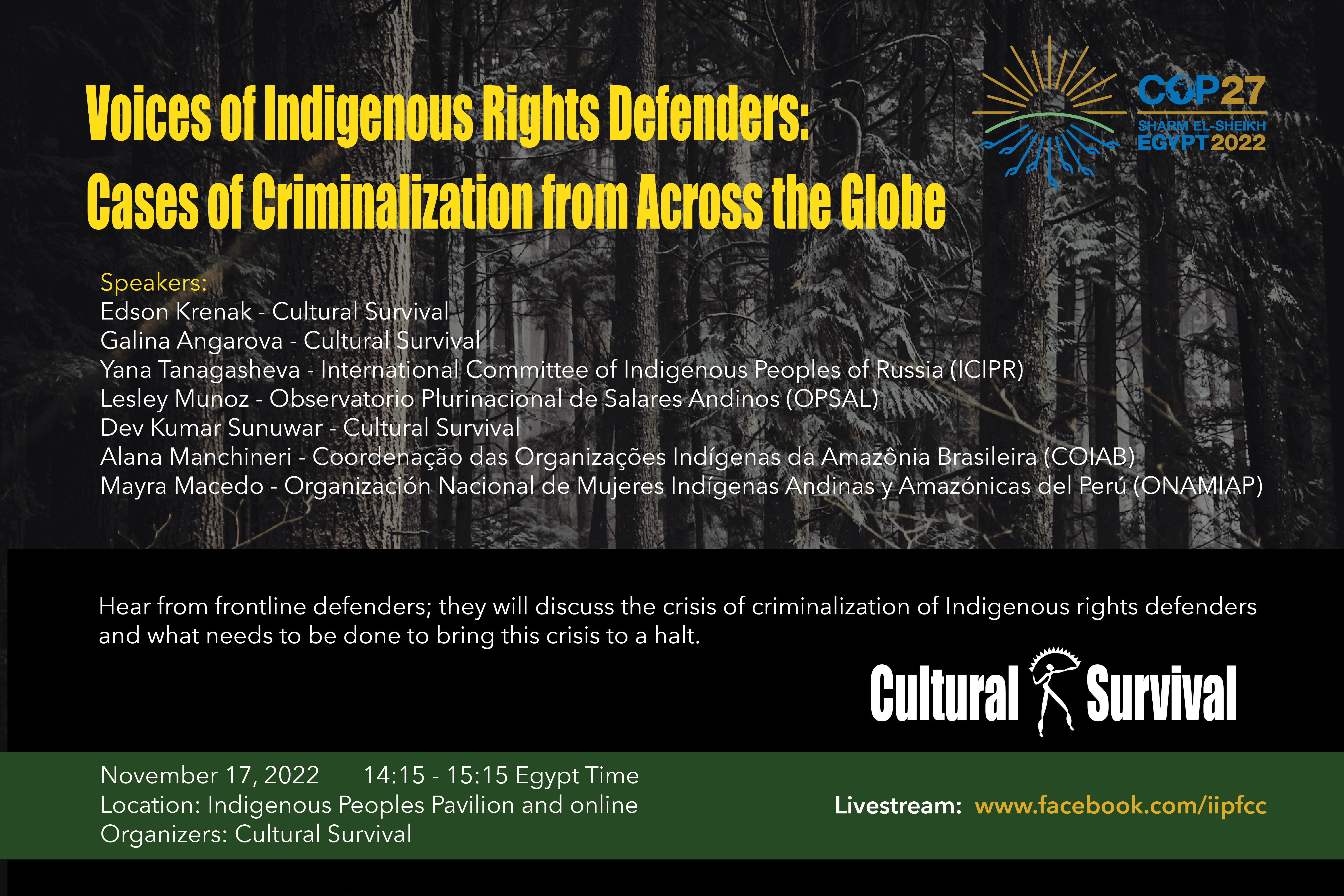
November 17, 2022 14:15 - 15:15 Egypt Time
Voices of Indigenous Rights Defenders: Cases of Criminalization from Across the Globe
Frontline Defenders reported that at least 331 human rights defenders were killed in 2020, 69 percent of whom were specifically defending Indigenous land or environmental rights and 26 percent of whom focused on Indigenous Peoples’ rights in particular. In the three years prior to October 2020, over 25 percent of rights defenders who were killed were Indigenous, despite representing just 6 percent of the global population. At this session we will hear from frontline defenders; they will discuss the crisis of criminalization of Indigenous rights defenders and what needs to be done to bring this crisis to a halt.
Speakers:
Edson Krenak - Cultural Survival
Galina Angarova - Cultural Survival
Yana Tanagasheva - International Committee of Indigenous Peoples of Russia (ICIPR)
Lesley Munoz - Observatorio Plurinacional de Salares Andinos (OPSAL)
Dev Kumar Sunuwar - Cultural Survival
Alana Manchineri - Coordenação das Organizações Indígenas da Amazônia Brasileira (COIAB)
Mayra Macedo - Organización Nacional de Mujeres Indígenas Andinas y Amazónicas del Perú (ONAMIAP)
Location: Indigenous Peoples Pavilion and online
Organizer: Cultural Survival
